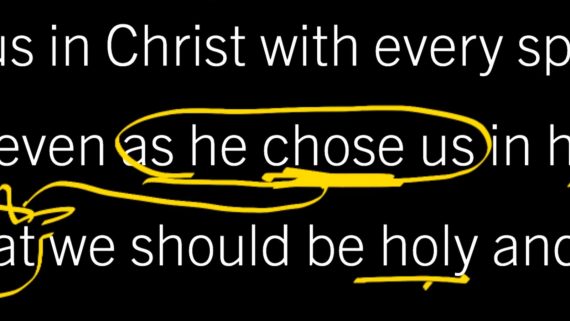 A man applying for a job was asked, “Why were you fired from your last job?”
A man applying for a job was asked, “Why were you fired from your last job?”
He answered, “I was overly ambitious. I wanted to take work home with me.”
The manager was a bit surprised. “That doesn’t seem like grounds for firing. Who was your employer?”
The man’s answer: “First National Bank.”
Today, as we continue to work our way through the book of Ephesians, we come to Paul’s instructions regarding the sin of stealing. Paul discusses this in Ephesians 4:28.
This verse comes in a section dealing specifically with five areas which many Christians struggle with and which are particularly harmful to the health and future of any church.
We’ve already looked at lying and anger, today we look at stealing.
Let’s begin to see this by reading Ephesians 4:28: Let him who stole steal no longer, but rather let him labor, working with his hands what is good, that he may have something to give him who has need.
This command by Paul is similar to the ones regarding lying and anger. Paul first states a negative command telling us what not to do, and then he gives a positive command, telling us what to replace that sinful action with, and then he concludes with a motivation for why we should follow his instructions.
Let’s begin with the negative command.
The Sin of Stealing (Ephesians 4:28a)
Let him who stole steal no longer,
Paul is speaking specifically to those who have stolen in the past and who are currently stealing. He is speaking to all the former or current thieves within the church.
He says, “Those of you who steal … stop it!” This is, by the way, one of the Ten Commandments. Exodus 20:15 says, “Do not steal.”
Now most of you believe that you do not steal, and so right about now, you are beginning to think of ways to tune today’s message out because it doesn’t apply to you.
But the truth is that all of us are thieves in one way or another.
So when Paul says, Let him who stole, he is talking to all of us. Most of us are thieves, and we don’t even know it.
Now, we all know what stealing is: taking something that doesn’t belong to us.
But there are various forms of stealing, and some of them are more obvious than others. For example, there is bank robbery. This is clearly theft. The most successful bank robbery in United States history resulted in the loss of $18.9 million. That a lot of money.
And then of course there is the simple form of theft from stores, businesses, and homes. This occurs through shop lifting or breaking and entering when a person takes what does not belong to them. This also is an obvious form of stealing.
But there are numerous other ways of stealing that do not involve bank robbery or simple theft from stores and businesses. There are lots of ways of stealing, and probably all of us are guilty in one way or another of stealing.
Our politicians in Washington DC have figured out how to steal billions in tax-payer dollars and launder it through NGOs, Non-Government Organizations, so that the politicians get insanely rich at tax-payer expense.
Bankers and investors and stock traders have found ways to defraud investors and destroy companies by short selling stock so that they can get rich and wealthy while putting others out of work.
On the other side of the spectrum is the entire welfare state. While welfare aid is a good program for some, there are many more who are on welfare who could be working. Those who take welfare and disability payments when they could be working are also stealing from those who do work.
And then even among those who do work, it is a form of theft to be lazy at work, or to spend half your day on social media or surfing the internet, but this is a very common practice with many employees in various businesses.
In Matthew 22:21 Jesus mentions two other forms of stealing. He says, “Give to Ceasar what is Caesar and give to God what is God’s.”
The first part of this statement is in reference to taxes. If we fail to pay our taxes, then we are stealing from the government.
The second part of the verse has to do with giving our time, energy, and money to God. But of course, you can’t really give these things to God Himself, but we give to God by helping people in need. So if we do not support ministries, charitable causes, or help people in need, then we are stealing from them, and therefore, stealing from God.
And the craziest thing about all of these sorts of theft is that the person doing the thieving really doesn’t think they are doing anything wrong. They are just taking what they got coming. They are taking what is owed to them. They’re just protecting their investments, or saving for a rainy day.
There are a million excuses people give for the various forms of theft they commit. And I would say that in various ways, since there are so many forms of stealing, all of us steal in one way or another.
And Paul says here in the first part of Ephesians 4:28 to stop stealing.
Next, he gives us the cure for stealing.
The Cure for Stealing (Ephesians 4:28b)
… but rather let him labor, working with his hands what is good
The root attitudes behind stealing is most often selfishness and laziness. It’s selfish, because it is the desire to have, to possess what I want. Stealing is all about “me” and my desires. It shows a complete lack of respect for others and their possessions. The thief says, “I alone matter, nobody else counts.”
Because of this selfishness, the outlook of the thief makes fellowship among Christians impossible.[1]
Stealing also comes from laziness because ultimately, the thief dislikes work. He despises honest labor. His idea is to have the maximum while doing the minimum.[2] I know that robbing banks is a lot of hard work, but for the most part, bank robbers see it as an easier way to get money than through working honestly at a job.
And other forms of stealing are the same. Most often, if you are diligent and disciplined enough, you can work hard enough and long enough in order to buy the things you want. But those who steal, do so because they think it is a shortcut. They want that piece of clothing now—and so they shoplift.
It’s basically the same attitude behind all forms of stealing. We want money, we want possessions, and we want them now. Stealing helps us get what we want now, rather than taking the hard route of working for them.
So Paul, knowing that selfishness and laziness is behind most kinds of stealing, tells those who have stolen to replace stealing with labor, with working with his hands.
The word Paul uses for labor is a very strong word meaning “labor to the point of exhaustion.” It is beyond just getting a job. In today’s society, almost everybody has a job. That is not what Paul has in mind here. He says labor—wear yourself out in your job.
And then, at the end of this phrase, Paul uses that word good in reference to working. Work is not bad. Work is not undignified. Work is good. Yes, rest is important, but we do not work so that we can rest. Some people seem to be at work just so they can have fun on the weekend, or so they can have a good retirement. No, Scripture is very clear, we do not work so we can rest … we rest so we can do better at work.
Some people say that work is a curse. They say that God cursed Adam and Eve in Genesis 3 with work after they ate of the forbidden fruit. But that’s not true. Adam and Eve had work to do before they ate from the tree. The curse afterwards was only that their work would get more difficult.
So work is not a curse. Work is a good blessing from God. Work is one of the purposes and goals of humanity. A person who does not work is a person who is not fulfilling their purpose.
Yet we live in a society that enshrines leisure. We are experts at doing just the bare minimum at our work places. Unions, which originally were for the protection of the employees, now are detrimental to most workplaces, because nobody is allowed to work faster than the slowest employee. We’ve become lazy at work. We live for the weekends. We’ve developed slogans like TGIF (Thank God It’s Friday). We work only so that we can play.
I think that there is a danger in becoming a workaholic, but there is far more danger in becoming lazy at our jobs. We often look upon work as a curse, but when you go back and read Genesis, we discover that work was not part of the curse. It was part of life before Adam and Eve were kicked out of the Garden of Eden. There is dignity and Godliness in a job well done.
Anything short of this is a form of stealing. The moment we begin to regard work as something degrading, as a nuisance in the way of fun, we are on the slippery slope toward stealing.[3] That is what Paul is saying here in Ephesians 4:28. An honest days’ work is a gift to yourself, to your family, and to society. It is a good thing to put in a hard day of work.
The principle Paul gives here is similarly stated over in 2 Thessalonians 3:10 where Paul says, “If anyone will not work, neither shall he eat.”
There is no mooching, there is no freeloading, there is no laziness … there is no stealing for the Christian who wants to please God.
By not working, you are stealing—from others, from God, and from yourself. So to stop stealing, start working. Replace stealing with working.
Finally, in Ephesians 4:28, Paul gives us the reason we should do this. The motivation to stop stealing.

The Motivation Against Stealing (Ephesians 4:28c)
… that he may have something to give him who has need.
This is completely contrary to modern motivations for work. We think hard work should result in a better standard of living: a better house, a better car, nicer vacations.
But Paul says, “Work hard, not so that you can get more, but so that you can give more.”
The antidote to stealing is working to supply—not for our own needs—but for the needs of others. This is one of the main differences between communism and Christianity.
Karl Marx praised the example of the early Christians in Acts 2:44-45 when it says that they had all things in common, and each one sold his property to supply for the needs of others. It is supposedly this principle that communism is built upon.
But as we have seen in the former Soviet Union, living this way breeds laziness in those who have power. Was the Bible wrong? No. Karl Marx and communism misunderstood what was going on.
Communism is built on the principle which says “What is yours is mine. Your work helps me.”
The Christian work ethic, on the other hand, is built around the principle which says, “What is mine is yours. I work to help you.” The two are similar, but very different.
Communism gives people an excuse to steal from others. The Christian work ethic gives people a reason to work for others. One results in stealing, the other results in giving. One comes from the sinful nature, the other can only come from the indwelling power of the Holy Spirit.
So that is what Paul is talking about here. The way to defeat selfishness and greed, the way to defeat stealing, is through generosity. Rather than taking from others, start looking for ways to give to others. That is the way to defeat stealing. Simple, isn’t it?
Some people have tried some not so simple solutions to stealing.
In 1947 a prison inmate by the name of Willard Wright consented to an experimental operation involving the cutting of nerve pathways in the forebrain. It was an attempt to discover a cure for his urge to steal. He behaved so well that he was paroled after two-and-a-half years. He secured a job, got married, and gave every evidence of going straight.
Five years later, in Pittsburgh, Wright was identified as the man who had passed some stolen goods. Police found thousands of dollars’ worth stored in his home. Back in prison, Wright simply said, “With me, it just didn’t work.”
Dr. Edward E. Mayer, Allegheny County court behavior expert, said that in his opinion there never was any reason to believe it would work, because a lobotomy reduces self-control. When detectives asked Wright why he had gone back to crime, he shrugged and said, “You fellows know the questions, so you ought to know the answers.”
In commenting on this story, Time magazine said, “The truth was that neither the detective nor the neurosurgeons were any nearer to knowing what makes an incurable thief, let alone how to cure one.”
But where science has failed, the Bible has the answers.
If you have trouble with stealing—get a job (if you don’t have one)—so that you can buy what you need, and so that you can have something to give away. Maybe it would also be a good idea to go home, and pick out some of your possessions to give away.
If you have been stealing from your place of employment, I would encourage you to not only return what you have stolen, but also to replace it with extra. The thief in the Old Testament had to return five times as much as he stole. If you stole a box of pens, go buy five boxes and put them in the supply room.
If you are stealing from God, if you are always worried about your bills, and your car payment, and the credit card charges—take your paycheck every month, and before you pay any bills, cut out of it a generous portion to make available to others. This might require you to get control of your spending. Giving to others requires you to start controlling your money, rather than having your money control you. You will be forced to budget. You will have to stop buying things on a whim, and will have to watch your spending. And I believe God will see and will bless. Maybe not with financial blessing, but with self-control and eternal reward.
Which brings up an important point.
One of the curious things about stealing is that those Christians who steal are actually losing possessions. By taking from others, they are actually losing out. Paul says in 1 Corinthians 6:9-10, “Do not be deceived. Neither fornicators, nor idolaters, nor adulterers, nor homosexuals, no sodomites, nor thieves, nor covetous, nor drunkards, nor revilers, nor extortioners will inherit the kingdom of God.”
Inheriting the kingdom of God is not the same thing as receiving eternal life. Some confuse the two, but they are vastly different. Inheriting the kingdom of God is similar to receiving an inheritance from a rich grandfather, or from some other wealthy relative.
Generally, the largest portion of the inheritance is given to the son/daughter, grandson/granddaughter, nephew/niece, or whomever most pleases the wealthy relative the most. Those who displease the wealthy relative are disinherited.
Paul is telling us in 1 Corinthians 6 that God is our wealthy relative, and among those who displease God are Christians who steal. Therefore, he will disinherit them. They will make it to heaven—Paul cleared that up in 1 Corinthians 3—but when they get there, their stealing will have actually resulted in a loss of inheritance, a loss of possessions, a loss of eternal reward.
When you take from others you are actually stealing from yourself for eternity.
Conclusion
In closing, let me say that in all of this, we don’t want to be legalistic. A man once told me that if he was walking down the street, and he saw a penny lying on the sidewalk, he would pick it up and take it into the closest business because they owned that part of the sidewalk, and so they owned that penny, and he didn’t want to steal it from them.
He also said that he would never even take an extra paperclip home from the place he worked. He said that if he got home from work and found a paperclip in his pocket, he would get back in his car and take it back to the office. This is a little ridiculous. (This man was later convicted of child molestation, which shows that extreme legalism in one area is often just a way of hiding or compensating for extreme sin in other areas.)
The point here is not to be legalistic. That is what the Pharisees did. In Matthew 23, Jesus condemns them for their legalism. He says they would strain out a gnat and swallow a camel, meaning that they tried to follow the law so carefully that they missed the whole point.
Obedience to the law is not an end in itself. Rather, love is the fulfillment of the law (Rom 13:8; Gal 5:14; Matt 22:37; etc.).
These commands which Paul gives here, are not given so that we blindly obey them, but so that we can better love each other and reveal to the world our love for God.
Don’t stop stealing simply because Paul says so here. That will never work. You will never be able to stop. The goal is not simply to stop stealing. The goal is generosity out of love for the brethren. Those who truly love other Christians and who truly love God will give generously and joyfully from what they have worked hard for.
Notes
[1] D. Martin Lloyd-Jones, An Exposition of Ephesians 4:17-5:17: Darkness and Light (Grand Rapids: Baker, 1982), 247.
[2]Lloyd-Jones, 246.
[3] Lloyd-Jones, 246.







 A raft of logs would be floated from the Black Sea and when they got to Ephesus or Corinth, the different lumber merchants would come and look over the logs and make their selections of which ones they wanted. One would say, “I will take these,” and another, “I’ll buy those over there.”
A raft of logs would be floated from the Black Sea and when they got to Ephesus or Corinth, the different lumber merchants would come and look over the logs and make their selections of which ones they wanted. One would say, “I will take these,” and another, “I’ll buy those over there.”
 Just as you can know that you have eternal life because Jesus does not lie to us, we can know we have been sealed because God does not lie to us. If you have believed in Jesus for eternal life, then you have been sealed by the Holy Spirit. You can take it by faith because it is a promise of God and God does not lie. The indwelling Holy Spirit is a deposit in your life that God has given to you in advance of your final glorification, redemption, and new resurrected body in eternity.
Just as you can know that you have eternal life because Jesus does not lie to us, we can know we have been sealed because God does not lie to us. If you have believed in Jesus for eternal life, then you have been sealed by the Holy Spirit. You can take it by faith because it is a promise of God and God does not lie. The indwelling Holy Spirit is a deposit in your life that God has given to you in advance of your final glorification, redemption, and new resurrected body in eternity.


 Do you see the logic here? If we are going to say Jesus was elect, and that this means that He was chosen by God to perform a certain task, then the same meaning of election should apply to others also. And indeed, this is exactly what Scripture reveals when we study all the other passages on election in Scripture.
Do you see the logic here? If we are going to say Jesus was elect, and that this means that He was chosen by God to perform a certain task, then the same meaning of election should apply to others also. And indeed, this is exactly what Scripture reveals when we study all the other passages on election in Scripture.
 Well, that is what the rest of Ephesians is all about.
Well, that is what the rest of Ephesians is all about.
 Have you ever been disgusted with God? So disgusted with how God lets evil go unchecked, and how God doesn’t seem to protect you or your family or your plans, or how God seems to bless the wicked people while not helping the righteous?
Have you ever been disgusted with God? So disgusted with how God lets evil go unchecked, and how God doesn’t seem to protect you or your family or your plans, or how God seems to bless the wicked people while not helping the righteous?
![[#42] Genesis 3:7 – The Greatest Rivalry of All Time](https://redeeminggod.com/wp-content/uploads/2016/06/adam-eve-fresco-150x150.jpg)
 Genesis 3:6-7 are the central two verses of Genesis chapters 2–3. In a previous episode, we looked at Genesis 3:6, and learned a foundational truth about humanity. This episode reveals another foundational truth from Genesis 3:7.
Genesis 3:6-7 are the central two verses of Genesis chapters 2–3. In a previous episode, we looked at Genesis 3:6, and learned a foundational truth about humanity. This episode reveals another foundational truth from Genesis 3:7.